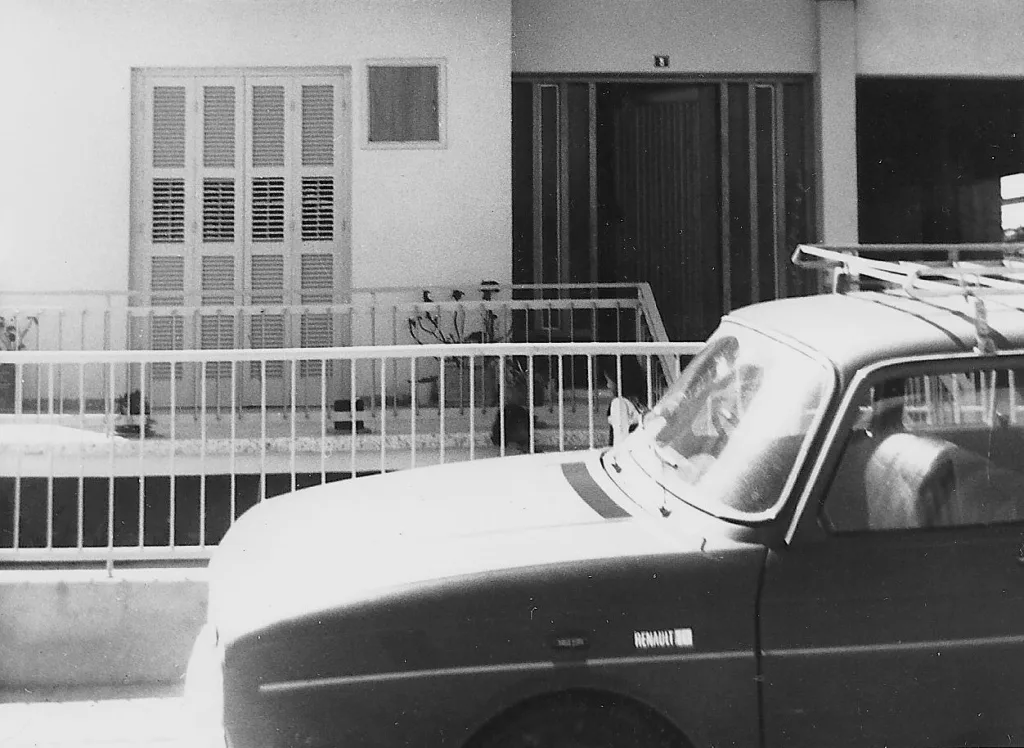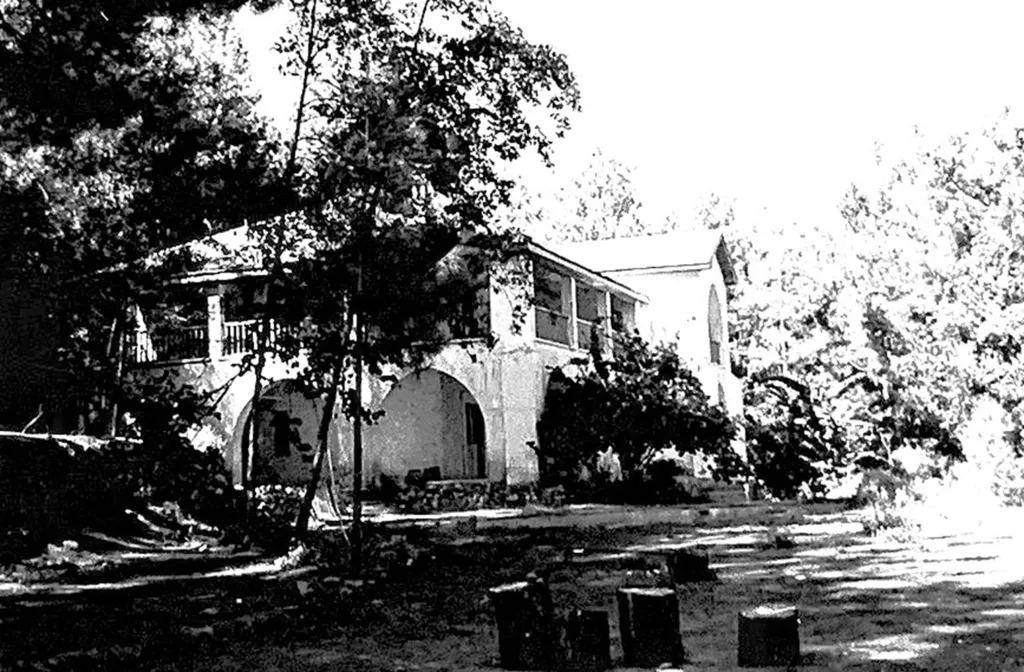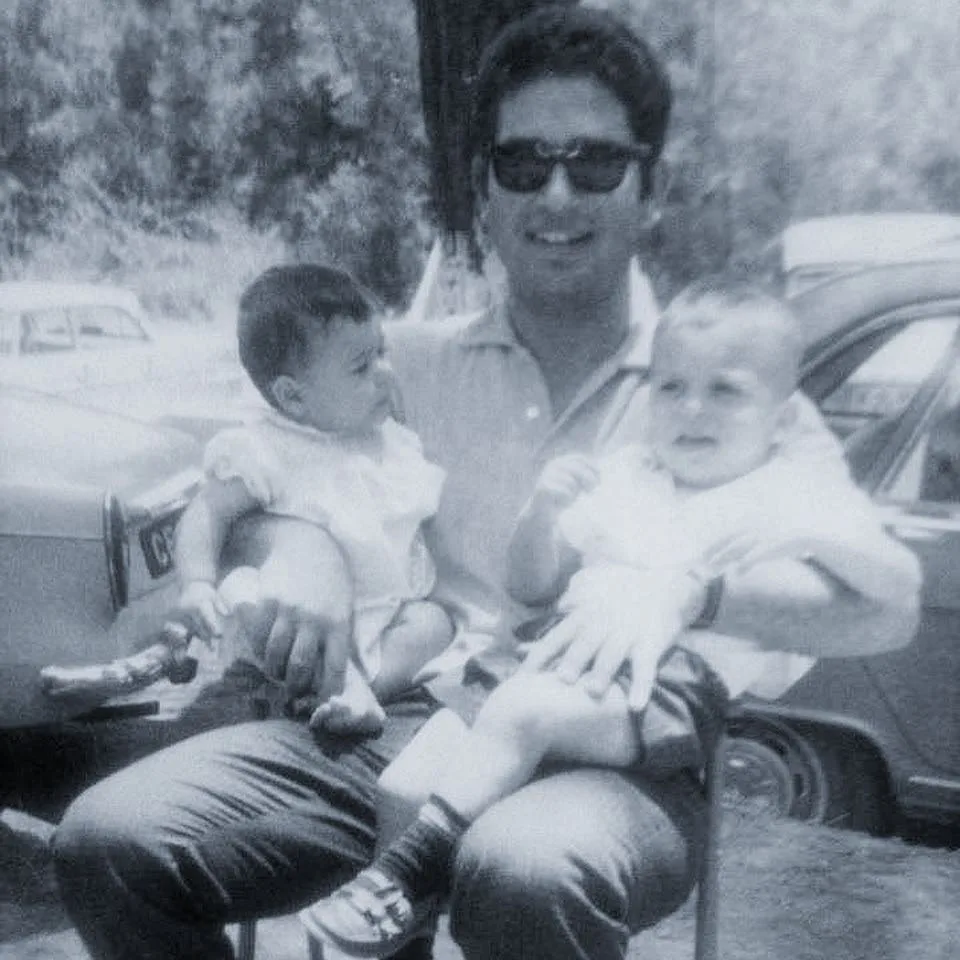When Turkish troops landed on the northern shores of Cyprus on 20 July 1974, six-year-old Timos Roussos was sitting on the floor of his family’s home in Lemesos, cradling fear he couldn’t yet understand. He had already experienced one trauma that summer – the Greek military coup that overthrew the government of Archbishop Makarios just five days earlier. But what was to come next would etch itself onto his childhood in a way no adult could have prepared him for.
“I remember the shooting during the coup and hiding under the table with my little sister,” he tells The Greek Herald. “My mother cried when the news report said Makarios was dead.”
Timos, now an accomplished artist and educator living in Sydney, Australia, is one of the many children of 1974 whose lives were shaped by the war – not just by its bombs and bullets, but by the long shadows it cast across a nation, its people, and their sense of home.
This year marks 51 years since the Turkish invasion and subsequent occupation of the northern third of Cyprus. And while the official lines of history have been debated and politicised for decades, the lived experiences of ordinary Cypriots like Timos remain a powerful reminder of what was lost – and what is still being fought for.
A porch full of headlights, a house full of strangers
The first night of the invasion is carved into Timos’ memory with cinematic clarity.
“The BBC was reporting that Turkish warships had surrounded the entire island,” he recalls. “Friends of ours who lived near the beach were afraid of getting bombed. They asked my parents if they could spend the night with us and go hide in the mountains the next morning.”
That evening, his family waited on the front porch for their friends to arrive. “Off in the distance, we saw a pair of flashing headlights. We had a curfew then and not only was driving not allowed, but we were supposed to have all lights out.”
Then came a second set of lights. Then a third. And a fourth.
“When our friends were packing their car to come, neighbours saw them and asked if they could come too. Soon, the whole neighbourhood was on the road,” Timos says.
His family’s home was a duplex, one half of which was still under construction. “That night over 70 people slept on the concrete floor in that unfinished house.”

Among the people who found shelter there was Timos’ best friend from kindergarten. His mother had just given birth and was desperately trying to soothe her crying newborn.
“My mother made up a place for the young mother in our hallway. She stuffed towels around all the doors to prevent any light from escaping and spent the whole night in the kitchen, boiling water and preparing the milk bottles for the baby,” he recalls. “No one got much sleep.”
In the middle of the night, his friend knocked on the door between the two sides of the house. He wanted a glass of water.
“When I brought him a filled cup, he asked, ‘Where is my dad?’” Timos pauses. “Earlier, I had overheard the women talking and one of them had said that my friend’s father was one of the first men killed in the invasion, but they were keeping it from the wife because she had the infant to worry about. My 6-year-old heart was heavy with this information I couldn’t tell my friend. ‘I don’t know,’ I replied.”
He breaks slightly. “Repeating this story 51 years later still makes me cry.”
The fear was everywhere
Timos was born in Lemesos and raised in Ayios Nikolaos, surrounded by extended family. As the middle of five children, he remembers going to school and visiting his grandparents – until the summer of 1974 changed everything.
His family home was caught between the crossfire during the coup. “It was scary seeing the red bullets flying by the bedroom windows.”
His parents – both teachers at an international school – did their best to shield their children from the chaos. “They found comfort in prayer and reading the Bible. My father read from the Psalms.”
But the fear was palpable.
“We couldn’t play in the street or visit friends. We stayed in the house all day,” Timos says.
An island displaced
Although his family was not forcibly displaced, the war engulfed their community.
“Many people we knew fled from the cities to the mountains,” he says. His own family took refuge at Saitas, camping near an abandoned hotel with other families from Lemesos, Larnaka and Lefkosia.
“One morning we woke up to discover [the hotel] was full of people who had come over the mountains from various villages in the north.”

Timos’ father, who had travelled extensively across the island in the 1960s, began making trips to refugee camps to search for old friends. “There were several English families in our neighbourhood who had been airlifted out early on. Their empty houses were suddenly occupied by multiple refugee families.”
The schools opened late that year. “Our classrooms were full of people living there. When we finally did go back to school, we had to do it in shifts because there were so many more kids.”
No explanations – only action
Amid the chaos, Timos’ parents did not dwell on fear. They took action.
“One of the first things my father did was visit a local furniture maker and ask for donations of foam off-cuts,” he says. “He would pack our car full and drive to the various encampments, first giving them to friends and then distributing to others.”
Next came medicine and vitamins, then clothing. Timos remembers sorting through boxes sent from the UK, the Netherlands, the USA, and Canada. “At first, if something was a little torn or damaged, my mother would mend it. But after a while, the sheer volume of stuff was so great we could only divide between usable and unusable.”
In one camp – an old school theatre – Timos delivered clothes to a boy his age. “The family had set up their space on the theatre stage, alongside several other families,” he says. “Most of these activities were not discussed. There were no explanations or justifications. People were in need, and we had a moral obligation to help.”
![Kliniki Mariou on Leoforos Makariou in Lemesos, where Timos was born. [1960s]](/wp-content/uploads/2025/07/2.-Kliniki-Mariou-on-Leoforos-Makariou-in-Lemesos-where-Timos-was-born.-1960s-1024x587.webp)
The birth of a charity
As it became clear the refugee crisis was not temporary, Timos’ father formalised their efforts.
“After the foam mattresses, the vitamins, the clothing donations, my parents realised the situation was becoming long term. My father was associated with a mission that was originally established to help earthquake survivors in Greece in the 1950s. Through them he established the Apostolos Varnavas charity to provide monthly support for refugee children,” he says.
Donations poured in from North America and Europe. Every month, his father would deliver financial aid by hand. Before Christmas, he would take note of every child’s shoe size and buy new shoes to distribute across the camps.
In the years that followed, many of the supported families stayed in touch.
“My parents would get invitations to birthdays, then weddings and baptisms, and occasionally, sadly, funerals. As they grew into young adulthood, some of the children didn’t survive and ended their lives – the horrors they had endured were too traumatising,” Timos explains.
His sister, who still lives in Cyprus, often hears their family name spoken with reverence.
“Sometimes, when they see her last name (she kept our family surname) they ask, “are you the daughter of…?” followed by tears and testimonials from people who have fond memories of my parents, both of whom have passed away,” he says.

The wounds remain
The trauma of that summer never fully left.
“I don’t like fireworks, the sound of helicopters, the jet flyovers on Anzac Day. I’m easily triggered by descriptions of violence and suffering. I abhor nationalism(s) and militarism. I dislike labels. I’ve written poetry and created artwork, but I’ve never sought counselling or therapy for these childhood experiences,” Timos says. “Sometimes I think I may have PTSD.”
His adult life has been defined by a strong sense of social justice and human rights.
“I don’t know if it’s wholly due to my parents’ teachings and lived examples, but I have a strong sense of social justice and human rights,” he says.
He is disheartened by what he sees as division within the Cypriot diaspora. “I feel like the diaspora is very divided with vastly differing perspectives. It can be very discouraging and I often find myself disconnecting. Within the Greek-Cypriot communities, teaching about the invasion has become very one-sided.”
While visiting Berlin recently, he reflected on how Germany was able to reunite after decades of separation. “When the Berlin Wall fell in 1989, we had a saying in the Cypriot community around Washington DC: ‘After Berlin, the turn of Nicosia.’ I don’t know if I feel that optimistic.”
![with youngest brother [Petra tou Romiou, 1974]](/wp-content/uploads/2025/07/6.with-youngest-brother-Petra-tou-Romiou-1974-824x1024.webp)
A message for the world
Last year, the 50th anniversary came and went without the recognition Timos had hoped for.
“It makes me sad and angry. I expected much more to be done,” he says.
So, what does he want people outside Cyprus to know?
“Don’t forget us,” he says, with force and sadness. “We are a part of the European Union and the United Nations, yet our country is still divided. The ‘solutions’ offered by both of those bodies have not been just and equitable.”
“Cypriots – of any ethnicity or religion – should be able to live, work, and travel freely anywhere around the island. Refugees should be able to return, if they want.”
His loyalty, he says, is not to any flag.
“I am proudly Cypriot – not Greek or Turkish. At the same time, I consider myself a citizen of the world, a kind of global nomad living in self-imposed exile, perpetually an outsider. When I became an Australian citizen, I was asked where my loyalties lie. I found the question offensive. My loyalty is to the human race,” Timos concludes.
![5.sister & brother with refugee friends [Saitas] feature sister & brother with refugee friends [Saitas] feature](/wp-content/uploads/2025/07/5.sister-brother-with-refugee-friends-Saitas-feature-jpg.webp)